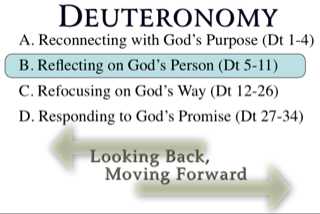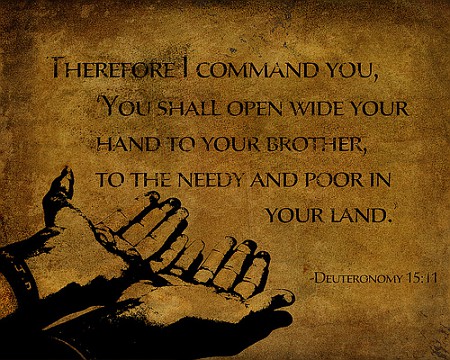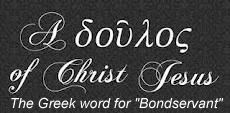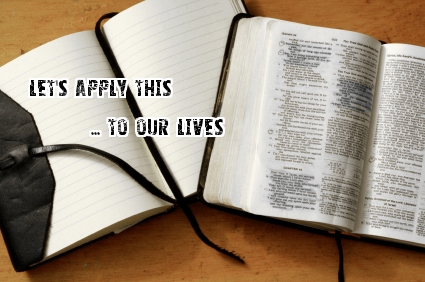 Review & Intro: In the last chapters, we have seen Moses reviewing the Law for the people of Israel before they enter the land of Promise. In most cases, he has been giving an abbreviated form of the original time he delivered these things to them. However, as we begin chapter 15, he is actually giving more detail about the Sabbath Year than we received earlier in Exodus and Leviticus. What more do we learn?
Review & Intro: In the last chapters, we have seen Moses reviewing the Law for the people of Israel before they enter the land of Promise. In most cases, he has been giving an abbreviated form of the original time he delivered these things to them. However, as we begin chapter 15, he is actually giving more detail about the Sabbath Year than we received earlier in Exodus and Leviticus. What more do we learn?Deuteronomy Chapter 15 - Observation Questions
1. What were they to grant at the end of every 7 years? vs. 1
2. What was every creditor to release at the end of every 7 years? vs. 2
3. Who was this specifically in regard to? vs. 2,3
4. Take a moment to review what God had told them about every 7th year. Other than releasing the debts of all the brethren, what else was to happen to the land every 7 years and how were they to eat during those years? Read and comment with a summary of the following review:
- Exodus 23:10-11 -
- Leviticus 25:2-7 -
5. If Israel was obedient to the voice of the Lord in observing His commandments, what should not be among them because of the blessings He would bring to them in the land they would inherit? vs. 4,5
6. What was the specific blessing coming to them if they would obey the Lord? ... Fill in the blanks from verse 6. ... "For the Lord your God will bless you as He has promised you, and you will _____ to many nations, but you will not _______, and you will ______ over many nations, but they will not ______ over you."
7. What attitude (the heart) and action (the deed) was to be given toward any poor person in any of the towns they would be living? vs. 7, 8
8. How does this compare to what we have been told in the New Testament regarding the poor or needy among us? Comment on the verses below:
- Matthew 6:3 -
- Romans 15:26 -
- 2 Corinthians 8:13,14 -
- Galatians 2:10 -
- James 2:1-6 -
- James 2:16 -
9. Back to Deuteronomy 15. In regard to helping the poor, what was the temptation that they were to avoid in their towns as it got close to the 7th year of release of debt? vs. 8
10. If they did not take care of the poor for any reason, and the poor person cried out to the Lord in their need, what would it be in the eyes of the Lord against them? vs. 9
11. What would the Lord do for them if they were always generous to the poor and their heart was not grieved in giving to them in this manner? vs. 10
12. What is a fact concerning the poor then and now? Comment on the two verses below:
- Deuteronomy 15:11 -
- Matthew 26:11 -
13. Back to Deuteronomy 15. When a person could not pay back a debt, they mortgaged themselves to serve the creditor as a type of slave to them to pay them back with service rather than goods. They could serve no longer them 6 years. What was the creditor to do every 7 years in the Sabbath Year that God declared? vs. 12
14. When a kinsman was set free from serving, what was he to be supplied with as well? vs.13 - Name 3 things that were to be given to him liberally -
15. What were they to remember that would help them let go of the service every 7th year? vs. 15
16. Sometimes a person would not want to be set free from their service to a kinsman. During their time of service, they had been treated well and truly loved being a part of their family so to speak. If they did not want to be set free, they became a bondslave to them; a slave to them "by choice". (vs.16) ... How would that slave (male or female) be marked to show that he/she wanted to belong to a particular service? vs.17
17. How does this help you understand Paul and others calling themselves a bondservant of the Lord Jesus Christ, as well as Paul saying that he had the brandmark of belonging to Jesus? Comment on the following verses:
- Acts 4:29 -
- Romans 1:1 -
- 2 Corinthians 4:5 -
- Galatians 1:10 -
- Galatians 6:17 -
- Philippians 1:1 -
- Colossians 1:7 -
- Colossians 4:7 -
- Titus 1:1 -
- James 1:1 -
- 2 Peter 1:1 -
- Jude 1:1 -
- Revelation 1:1 -
- Revelation 2:20 -
18. Paul said that Jesus was a bond-servant of God the Father. What should this mean to us? Comment on the following verse:
- Philippians 2:7 -
19. Do you consider yourself a "bond-servant" of the Lord Jesus Christ? How should a bond-servant of Jesus conduct themselves to others and why? Comment on the verse below:
- 2 Timothy 2:24 -
20. It is a matter of choosing who we will serve. We had someone tell us we were brain washed and our answer was "We all are, but we have chosen Who we want to wash our brains". .... Jesus said we will either serve God or mammon (material things). When we choose to serve Jesus, we are choosing not to serve our own lusts, our own worldly cravings, and the temptations of the evil one. Comment on the following verses:
- Romans 6:17-23 -
- Romans 6:22 (specifically) -
Note: These men came to the realization that it's better to be enslaved to God for life than enslaved to sin, which results in death. What do you think?
21. Back to Deuteronomy 15. Why should a person not mind setting the other one free after the 6 years of service to them? vs. 18
22. What were the Israelites always to consecrate to the Lord? vs. 19
23. What were they not to do with the firstborn of their herd each year? vs. 19
24. What were they not to do with the firstborn of their flock? vs. 19
25. What were they to do each year with these firstborn animals? vs. 20
26. Where were they to do this? vs. 20
27. If the animal had any kind of defect (such as being lame or blind), they were not to sacrifice it to the Lord. (vs.21) They could, however, eat it still, like they would a gazelle or a deer. (vs.22) ... As always instructed, what was to be done with the blood of the animal? vs. 23
Application:
28. Being free with our money is closely related to being free with forgiving others of the sins they have committed against us. Remember the parable Jesus told about the man who was forgiven his debt, but would not forgive another indebted to him? Read the parable and then comment on the questions given.
- Read Matthew 18:21-25
- ..... Peter wanted to know how many times he would need to forgive his brother that sinned against him. What did Jesus tell him? ..... vs. 21,22
- ..... Jesus told a parable to illustrate this of a king who wanted to settle accounts with his slaves. ... One who owed him 10,000 talents was brought to him ... He did not have the means to repay and was going to have to be sold along with his wife and children for repayment to be made .... He fell to the ground and pleaded with the king. What did the slave tell him concerning the debt owed? vs. 26 ..... What did the king feel toward the man and decide to do for him? vs. 27
- ...... That slave turned around after being fully forgiven and found a fellow-slave that owed him some money. How did he treat the one who owed him? vs. 28 ..... That person asked for patience and time to repay as well. Did this forgiven man forgive the one needing him to do the same for him? vs. 30 .....How did the king deal with him when he found this out? vs.32-34
- ....... How does this compare to our unforgiveness of others according to Jesus? vs. 35
29. Freely we have received forgiveness of the debt we owed to God for our sins. Do we ever have the right to withhold forgiveness to another for whatever they have done to us? What does unforgiveness do to our hearts and how does it effect our relationship to God and others?
29. This chapter has been about having a free and joyful and thankful heart. We should remember that God set us free from slavery and set others free. We should remember how God has blessed us and bless others in need. When others borrow, give freely and expect nothing in return. (Jesus taught this in Luke 6:31-36)....Are you holding someone hostage to a debt they owe you, whether financially or spiritually? What would Jesus have you do according to all we have learned in today's lesson? Please share from your heart.
30. Summarize the lesson and post a prayer if you would like.





No comments:
Post a Comment